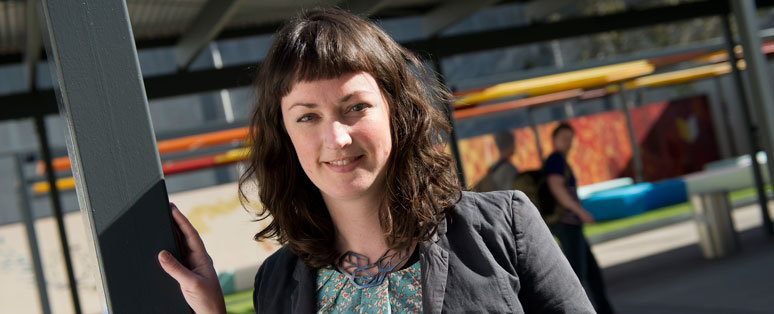Researcher Highlights
An alternative science
Dr Caragh Brosnan
The sociology of health and illness provokes something in Dr Caragh Brosnan, lecturer in Health Sociology in the School of Humanities and Social Science.

It sparks an unfathomable curiosity in health care and its value to society, but more fundamentally, the moral and principled human decisions that lie behind the science that governs our health and wellbeing.
She probes, enquires and delves deep to uncover questions like: what are the values and ethics that underpin our health care practices? What historical, social, and political factors have shaped our medical knowledge and medical education? How do everyday experiences at work interact with health professionals’ moral standpoints?
Ultimately, Caragh is concerned with how different kinds of knowledge come to be valued in health care and what the implications of this are.
Previously calling the United Kingdom home for 10 years, Caragh completed her PhD at Cambridge University in 2008. Her research focused on debates over medical curricula by comparing staff and students’ experiences at two different medical schools. This study showed that differences in curricula could be mapped onto other differences between medical schools, such as levels of funding, prestige and student demographics. Debates over medical curricula therefore needed to be understood as being shaped by schools’ relationships to each other.
In a postdoctoral project at King’s College London, Caragh examined how ethics manifested in a range of neuroscience disciplines.
“I found that scientists were not really aware of bioethics. Ethics for them meant going through the ethics committee, getting approval, and not thinking too much beyond that. At the same time, the kind of moral reasoning they actually drew on in their day-to-day work was not thought of as a form of ethics,” she said.
In 2012, Caragh joined the team at the University of Newcastle and has since been teaching into courses in Sociology and Nursing including Health Sociology; Substance Abuse and Social Disadvantage; and Complementary Therapies in Healthcare.
Her intrigue in complementary therapies has been supported by the Australian Research Council (ARC). Caragh was awarded the highly competitive ARC Discovery Early Career Researcher Award (DECRA) last year to conduct a comparative study in Australia and the United Kingdom on complementary and alternative medicine (CAM) university degrees; specifically focusing on chiropractic, traditional Chinese medicine and osteopathy.
Caragh is asking how what is taught in CAM university degrees reflects the status of the CAM professions. This question stems from her fascination with the social factors that shape how health professionals get trained. She explains that because these CAM courses now exist within universities, there is a general assumption that this translates into increased professional status in the medical field. To date, there is no study of what determines the actual content of these courses.
She is researching how scholars of these fields go about maintaining their difference from other health practitioners, amid pressure to prove they have a place alongside them in the university. “I want to know how these CAM programs retain their specific bodies of knowledge, which historically have been considered authentic and alternative to mainstream disciplines, while meeting the standards and particular quality outcomes applied to other health professional degrees.”
“These CAM programs pride themselves on offering a different approach to conventional healthcare but I want to know how that is sustained and taught in the university environment and how it differs across chiropractic, traditional Chinese medicine and osteopathy.”
She asks: “By teaching these courses at university, are they losing their claim to be alternative? What forms does alternative medicine take within a university? More broadly, what kinds of knowledge are seen as legitimate in the university?”
This grant will aid Caragh as she unearths some big questions that underlie our health system and will help inform the medical sector, the health education field and health professionals as innovation and technology takes health care to new strengths.
Caragh was recently the recipient of a new staff grant, which took her to Buenos Aires in 2012 to the International Sociological Association Forum where she presented a paper on her post-doctoral research.
This ARC grant however, takes the prize. “To be funded to do what really motivates me is just wonderful. The next three years will be spent conducting my comparative study here in Australia and in the United Kingdom, collecting and presenting data for publication as well as attending a range of international conferences to discuss and network with other professionals on the topic.”
The University of Newcastle acknowledges the traditional custodians of the lands within our footprint areas: Awabakal, Darkinjung, Biripai, Worimi, Wonnarua, and Eora Nations. We also pay respect to the wisdom of our Elders past and present.
